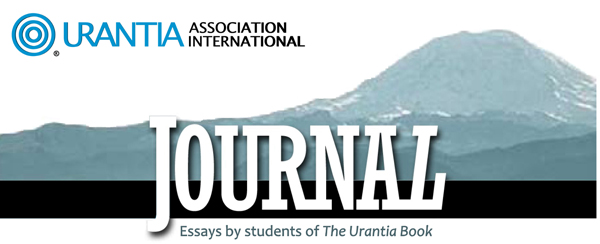Journal – May 2020
(Note: To print a hard copy of this Journal click the “Print Version” button above. After the print version appears, right-click into any white space and choose “Print.”)
|
In This Issue
|
|
Suzanne Kelly, USA  Greetings fellow Urantians, and welcome to the first edition of Urantia Association International’s 2020 Journal. These are truly trying times during the coronavirus pandemic and I’m sure the following insight and wisdom offered in the five incredible essays will provide guidelines for living in the 21st Century and will bring peace and enlightenment to your corner of the world at this time. “Such a life on such a planet!”
Greetings fellow Urantians, and welcome to the first edition of Urantia Association International’s 2020 Journal. These are truly trying times during the coronavirus pandemic and I’m sure the following insight and wisdom offered in the five incredible essays will provide guidelines for living in the 21st Century and will bring peace and enlightenment to your corner of the world at this time. “Such a life on such a planet!”
Our first contributor is Luis Garcia-Bory (Switzerland), who champions a new way of living on such a planet by reflecting on what he calls, A Positive Shift in Planetary Consciousness. Using the current worldwide spread of the coronavirus as a case in point, Luis summarizes the affect that this virus and the media-driven hysteria has had on the people of the world. He offers some encouraging remedies to help cure the side effects for everyone, not just those with the virus, as he states, “A conscious move from fear, inertia, and inaction might be required from each one of us so that we faithfully elevate our planetary consciousness and leave the individual selfhood-based realm of thinking in this pandemic and start reflecting on what The Urantia Book calls a ‘brotherhood ministry’ that focuses on unselfishly yielding fruits the spirit. That might require the enhancing of our mindsets from the question ‘How is this pandemic going to affect me and my loved ones?’ to ‘What can I do myself and how can I collaborate with others to be helpful to a larger number of people around me, especially the most vulnerable?’”
Next is Rick Lyon (USA), who is another marvelous and prolific contributor to the Journal and to all things Urantia. He provides a transcript of one of the teaching sessions he and his wife, Susan, presented to a group of online conference attendees at the Urantia Association’s ‘24-Hour Online Urantia Event,’ which he timely entitled The Benign Virus of Love. Rick knows that, “We have seen how quickly a harmful virus can change the world. A benign virus can do the same but in a positive way and even more so.” In keeping with the tumultuous times we are living in, Rick reminds us about the important things in life that form the backdrop of living, which we tend to forget in the hustle and bustle of a 24-hour society, but have now been catapulted to the forefront of civilized humanity. “Perhaps families will learn how to play together and talk with each other again. Perhaps we will reconnect with old friends by phone or video chat as we check on their health and well-being. Perhaps we will learn that by working together we can solve really big problems. Perhaps as people consider their future they will turn to God. Perhaps as they take a break from their ‘too busy’ lives they will find time to grow spiritually”.… Hopefully-perhaps!
The following article is, The Beatitudes Revisited: A Philosophy of Living by Patty McGrath (USA), who interprets life and soul growth modeled after Jesus’ instructions to the apostles. She maintains these beatitudes were for all his children when he said, And it will not be so much by the words you speak as by the lives you live that men will know you have been with me and have learned of the realities of the kingdom [140:1.7]. Patty takes us through the beatitudes one by one and maintains that: “The beatitudes are not the gospel of Jesus, but rather a philosophy of living. The gospel that Jesus spent three years going around the countryside preaching is simple—The Fatherhood of God and the brotherhood of man. The Universal Father is our creator and the Source of all that is real. Our Creator Father is spirit, and therefore, true reality is spiritual.”
Stuart Kerr III (USA), is also a prolific author of secondary works and has given us many published articles. Soul Rebirth and Morontia Soul Mind is one of my favorites. This is a wonderful snapshot of our next stop through the seven psychic circles, on the way to Paradise and finding our Father. Stuart summarizes that: “The soul is the joint creation of mortal mind and indwelling Adjuster. The soul is the child of the God-seeking mortal mind and the indwelling presence of the God-revealing and immortal Thought Adjuster. Its spiritual growth is independent of the intellectual self-consciousness, but it is capable of experiencing the presence of the Thought Adjuster and of recognizing its spirit leadings. Spirit identification is propelled by the strivings of mortal mind and survival is conditioned by the desires of mortal mind. The evolving soul will be an eventual portrait of the sum total of mortal decisions.”
Our final contributor is Mark Kurtz (USA), yet another who has been previously published in the Journal. He gives us a brief yet impactful vignette regarding Managing Your Model. It is a wonderful reminder of the plan that Jesus modeled for us. It is also poignant and bolstering at the same time. Mark, thank you for this tutorial, which is so needed now more than ever. Using a current comparison Mark asks, “…for us today, is The Urantia Book a grand attempt to help humanity revise its models? I believe it is. We need progress! Those who listen carefully to the authors and discern their meanings, are those likely to progress. We will comprehend what Jesus wants for us, either here or after graduating to the next life! God’s will shall prevail.” Amen!!
And many other wise individuals have said … This too shall pass, and we will become stronger from the experience. Onward and upward in brotherhood, friendship and love! Happy and enlightened reading—on such a planet!
|
|
Luis Garcia-Bory, Switzerland
(Transcribed and edited from an online presentation given at the 24-hour Online Urantia Event, March 21, 2020)
 The coronavirus pandemic of 2020 is likely to go down in the history of our planet as the moment in which most of us were urged to understand that Urantia is a self-contained living ecosystem, where anything occurring in one part of the web will impact, at varying degrees, all of us and the biological environment in which we all co-exist. This understanding, however, is not happening quietly. Struggle, pain and suffering are present in many corners of our world. And the most grievous aspect is of course the loss of thousands of lives we are already witnessing.
The coronavirus pandemic of 2020 is likely to go down in the history of our planet as the moment in which most of us were urged to understand that Urantia is a self-contained living ecosystem, where anything occurring in one part of the web will impact, at varying degrees, all of us and the biological environment in which we all co-exist. This understanding, however, is not happening quietly. Struggle, pain and suffering are present in many corners of our world. And the most grievous aspect is of course the loss of thousands of lives we are already witnessing.
In many countries affected by the pandemic, millions of people are instructed to stay home as hospitals and health services are stretched to their maximum capacity. Many poor countries struggle to even start the basic efforts needed to protect their people. Hysteria bubbles up and misinformation becomes rife. Panic dominates reason and irrational fear becomes commonplace. We empty grocery shelves and become obsessed with separation and individual safety. Our global supply of goods clogs up and economic calamity ensues. We start to understand that we are likely to witness the most severe economic depression of our lifetimes.
Our places of work stop, our cars stop, our airplanes and trains stop, our parks stop, our places of worship and reunion and physical activity and leisure stop. To one degree or another, many aspects of our lives come to a full stop as we are forced to stay apart to contain the speed at which infection spreads.
And this unexpected isolation brings about deep change in how we live our daily lives: suddenly we are forced to slow down and look at ourselves at home, look at our own lives beyond our work environment and notice more our support systems and the lives of those around us, rethinking our priorities beyond work deadlines and financial targets and personal and family ambitions.
 We are forced to stop and ponder the fact that our individual decisions and actions in relation to this pandemic will not only impact our loved ones in close proximity, but also our extended families and communities and other fellow humans far beyond our immediate spheres of interest, convenience or influence. We are forced to remember that we are, paradoxically, dispensable and valuable, and our life is at the same time as fragile and resilient as the next person’s. And that resilience and survival of the ecosystem can only be possible because we all form a network that glues together and brings stability to the whole.
We are forced to stop and ponder the fact that our individual decisions and actions in relation to this pandemic will not only impact our loved ones in close proximity, but also our extended families and communities and other fellow humans far beyond our immediate spheres of interest, convenience or influence. We are forced to remember that we are, paradoxically, dispensable and valuable, and our life is at the same time as fragile and resilient as the next person’s. And that resilience and survival of the ecosystem can only be possible because we all form a network that glues together and brings stability to the whole.
A conscious move from fear, inertia, and inaction might be required from each one of us so that we faithfully elevate our planetary consciousness and leave the individual selfhood-based realm of thinking in this pandemic and start reflecting on what The Urantia Book calls a brotherhood ministry that focuses on unselfishly yielding fruits of the spirit. That might require the enhancing of our mindsets from the question “How is this pandemic going to affect me and my loved ones?” to: “What can I do myself and how can I collaborate with others to be helpful to a larger number of people around me, especially the most vulnerable?” Individual Spirit-led action will help us take tiny steps onto the dawning of our planet’s age of spiritual striving and we can do this by:
- Re-centering our energy towards progressive thinking and action, which includes greater …intellectual keenness, economic wisdom, social cleverness, and moral stamina… in … the conquest of disease [71:8.1,8], and even as it has been revealed that humans are …far from the realization of these exalted ideals of progressive civilization, the civilized races have made a beginning—mankind is on the march toward higher evolutionary destinies [71:8.15] and we can make a conscious daily effort to continue this march.
- Refreshing our awareness and activation of our extraordinary spirit endowments: spiritual intuition (or faith insight), spiritual reason (or soul intelligence) and spiritual philosophy (the wisdom of spirit realities) which I believe are the foundations of religious faith (moral consciousness), through which we know …the soul of man reveals itself and demonstrates the potential divinity of its emerging nature by the characteristic manner in which it induces the mortal personality to react to certain trying intellectual and testing social situations. And it Exhibits inexplicable poise and sustaining tranquility notwithstanding baffling diseases and even acute physical suffering [101:3.4,8].
- Renewing our commitment to the unity of the service of God, embracing spirit unity (that we are all God’s children and spiritually alike [141:5.1]), as the cornerstone of sibling-centered service. Jesus taught the apostles that they had a mission "to comfort the afflicted and minister to the sick" and that they …should minister to all who suffer the sorrows of human sickness, pointing out in particular Diseases of the flesh—those afflictions commonly regarded as physical sickness and Troubled minds—those nonphysical afflictions which were subsequently looked upon as emotional and mental difficulties and disturbances [141:4.4-6].
Remembering that:

- Disease is not some sort of man-made curse or unfair and disproportionate act of God, but instead, by and large, a consequence of the “biologic adventure” pursued by Life Carriers in the process of designing, testing, developing and triggering of evolutionary human life in Urantia. This endeavor was far from perfect, as they inform us: But throughout all of this biologic adventure our greatest disappointment grew out of the reversion…of parasitic bacteria** on such an extensive and unexpected scale which …caused many distressful diseases in the higher mammals, particularly in the more vulnerable human species. Furthermore, they …discounted the difficulties involved because we knew that the subsequent admixture of the Adamic life plasm would so reinforce the resisting powers of the resulting blended race as to make it practically immune to all diseases… Any yet, But our hopes were doomed to disappointment owing to the misfortune of the Adamic default [65:5.2].
**{…and their auxiliary virus bodies… [65:2.3]}
- We can remain confident in the Father’s evolutionary plan for Urantia: There are, of course, certain compensations for tribulation, such as Michael's bestowal on Urantia. But irrespective of all such considerations, the later celestial supervisors of this planet express complete confidence in the ultimate evolutionary triumph of the human race and in the eventual vindication of our original plans and life patterns [65:5.4].
I see many encouraging signs that this pandemic is already bringing about a positive shift in consciousness amongst many of us around all continents of Urantia. We take closer notice of the fragility of the well-being of our elders, we try to protect more our children and our spouses; we come across for the first time to some neighbors we had never seen. We watch overpopulated and overly polluted cities becoming calm and clean again. We take more time to notice our grocery shop assistants, our pharmacy assistants, and a myriad more of those that help us live a clean, healthy and orderly life. We are invited to appreciate them more and be grateful to have them in our lives. Because to have them makes us whole, and with them, our ecosystem carries on.
Before us, there is a unique opportunity for planetary spiritual-uplift if we only seek to respond to the current events surrounding the crisis by consciously inviting the Spirit to take the lead and guide us towards a strengthening of the bonds that unite us as humans. Regardless of individual beliefs, preferences, origins or qualities. United in love of life and ministry, where beauty, truth, and goodness inspire and guide every decision, every action, every act of unselfish service we extend to others every day. Just like millions of other humans, our true Urantia heroes are battling and risking their own lives to treat and save others, to make possible that we have food on our tables and supplies in our larder, that our services run so that we can be connected and informed and take precautions and care for one another, in short, so that our ecosystem not only survives, but one day thrives again.
Please allow me to invite you to rethink how you can respond to this crisis by:

- Making a daily decision of staying positive and propagating positive thinking amidst the current vicissitudes, challenges, suffering, and perplexities, especially to those of us who are more emotionally sensitive.
- Being diligent, responsible, and sensible in the analysis of information we find, receive, assimilate, distribute, and use, staying away from conspiracy theories, magic cures, racist behaviors, and questionable sources of information.
- Remaining frugal and making calm decisions based on reliable information, avoiding fear mongering, panic behaviors, unnecessary accumulation of food and medical supplies, and patiently supporting those who might be reactive to these tendencies.
- Taking seriously the instructions and advice from our medical and government authorities and act accordingly in order to reduce to the minimum possible the risk of becoming infectious and inadvertent “spreaders” of the disease, especially if we show no symptoms.
- Above all, being of loving service—especially to the most vulnerable and at higher risk— conscious that our individual and joined actions will make all the difference in not only fighting the pandemic, but staying hopeful and confident in the future.
I would like to finish with two inspiring excerpts from The Urantia Book:
The divine spirit makes contact with mortal man, not by feelings or emotions, but in the realm of the highest and most spiritualized thinking. It is your thoughts, not your feelings, that lead you Godward. The divine nature may be perceived only with the eyes of the mind. But the mind that really discerns God, hears the indwelling Adjuster, is the pure mind. ‘Without holiness no man may see the Lord.’ All such inner and spiritual communion is termed spiritual insight. Such religious experiences result from the impress made upon the mind of man by the combined operations of the Adjuster and the Spirit of Truth as they function amid and upon the ideas, ideals, insights, and spirit strivings of the evolving sons of God. [Paper 101:1.3, page 1104.6]
That, then, is the primary or elementary course which confronts the faith-tested and much- traveled pilgrims of space. But long before reaching Havona, these ascendant children of time have learned to feast upon uncertainty, to fatten upon disappointment, to enthuse over apparent defeat, to invigorate in the presence of difficulties, to exhibit indomitable courage in the face of immensity, and to exercise unconquerable faith when confronted with the challenge of the inexplicable. Long since, the battle cry of these pilgrims became: “In liaison with God, nothing—absolutely nothing—is impossible.” [Paper 26:5.3, page 291.3]
|
|
Rick Lyon, USA
(Transcribed and edited from an online presentation given at the 24-hour Online Urantia Event, March 21, 2020)
 The name of my presentation is The Benign Virus of Love, which I thought was fitting since we are here in large part due to another type of virus. We are certainly not making light of the seriousness of the Covid-19 coronavirus but rather, we are trying to find comfort in the analogy and security in these teachings. We have seen how quickly a harmful virus can change the world. A benign virus can do the same but in a positive way and even more so.
The name of my presentation is The Benign Virus of Love, which I thought was fitting since we are here in large part due to another type of virus. We are certainly not making light of the seriousness of the Covid-19 coronavirus but rather, we are trying to find comfort in the analogy and security in these teachings. We have seen how quickly a harmful virus can change the world. A benign virus can do the same but in a positive way and even more so.
First, let me thank Chris Wood, Antonio Schefer, Urantia Association, the angels, and my Indwelling Spirit for this opportunity. I really like the idea of an around-the-world 24-hour study group because this revelation is a worldwide gift and people of all faiths, races, cultures, and demographics are studying and living these teachings 24/7. The sun never sets on the Urantia community.
Regarding the coronavirus, please follow all the guidelines for preventing and spreading this malignant disease. Wash your hands, avoid touching your face, use sanitizers, cover your sneezes and coughs, avoid being around others to protect yourself and them. This will pass, and as with the Lucifer rebellion, good things will come from it. We already see an outpouring of love and caring for others that we have not seen in many years. Perhaps families staying at home will begin to connect again and find the value in their home life. Perhaps families will learn how to play together and talk with each other again. Perhaps we will reconnect with old friends by phone or video chat as we check on their health and well-being. Perhaps we will learn that by working together we can solve really big problems. Perhaps as people consider their future they will turn to God. Perhaps as they take a break from their “too busy” lives they will find time to grow spiritually.
The mechanistic naturalism of some supposedly educated men and the thoughtless secularism of the man in the street are both exclusively concerned with things; they are barren of all real values, sanctions, and satisfactions of a spiritual nature, as well as being devoid of faith, hope, and eternal assurances. One of the great troubles with modern life is that man thinks he is too busy to find time for spiritual meditation and religious devotion. [Paper 195:6.7, page 2077.3]
Perhaps now they will.
In Paper 97, “Evolution of the God Concept Among the Hebrews,” one of the common themes we see in the teachings of the prophets that led many to their supposed failure was the new idea of an international God, a God of all nations, rather than a tribal or national God. This advanced teaching was too much for the people of those days but each prophet planted the seeds of a personal God for all men, nations, and worlds. This was the beginning of the idea of the Fatherhood of God and the ideal of the brotherhood of man.
Throughout preceding ages religion had chiefly been an affair of the tribe or nation; it had not often been a matter of concern to the individual. Gods were tribal or national, not personal. Such religions did little to satisfy the individual spiritual longings of the average person. [Paper 121:5.1, page 1336.5]
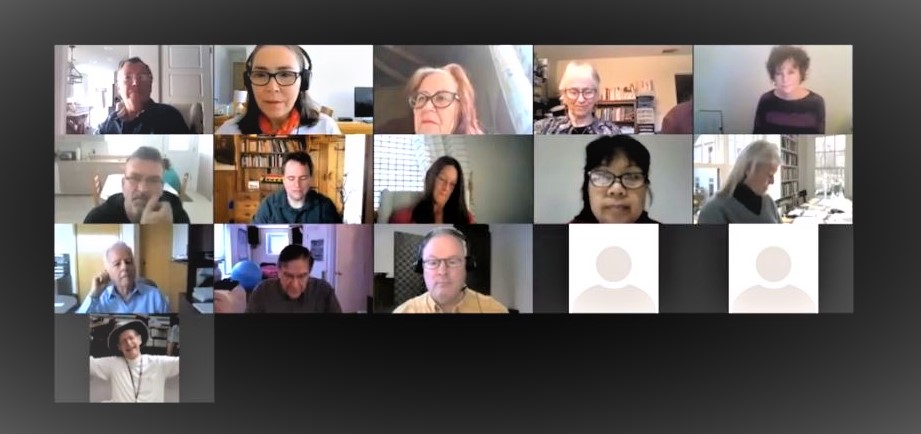 One thing I think we, as the Urantia community, can do to make this world a better place is to lead and facilitate the internationalization of a personal religion and the realization of the worldwide family of God. Rather than the social distancing caused by an age of technology—when we all need more personal interaction, more human contact—we should support and facilitate online projects like this one, virtual study groups, international events, and translations of The Urantia Book that bring together people from different countries and cultures even though we normally are socially distanced by where we live. We need to get to know each other more so that we spread the benign virus of love.
One thing I think we, as the Urantia community, can do to make this world a better place is to lead and facilitate the internationalization of a personal religion and the realization of the worldwide family of God. Rather than the social distancing caused by an age of technology—when we all need more personal interaction, more human contact—we should support and facilitate online projects like this one, virtual study groups, international events, and translations of The Urantia Book that bring together people from different countries and cultures even though we normally are socially distanced by where we live. We need to get to know each other more so that we spread the benign virus of love.
Let us discover and discuss a few things that The Urantia Book tells us about love and brotherhood. Obviously there is a lot to choose from!
God is like us in that he wants to love and to be loved. He does not want to be feared. He wants you to love him because you choose to love him because of who he is. The more we know God, the more we will love him and strive to become like him and in that process we will also learn to love each other as Jesus and God love us.
Jesus loves mankind with a dual affection. As the Son of God he loves us with a fatherly love—he is our Creator, our universe Father. As the Son of Man, Jesus loves us as a brother—he was truly a man among men. [Paper 140:5.2, page 1573.4]
At the last supper, Jesus gave us a new commandment. He said this new commandment is: That you love one another even as I have loved you [180:1.1].
And:
When I give you this new commandment, I do not place any new burden upon your souls; rather do I bring you new joy and make it possible for you to experience new pleasure in knowing the delights of the bestowal of your heart’s affection upon your fellow men. [Paper 180:1.2, page 1944.5, emphasis added]
There are great rewards for loving and being loved.
God first loved you. God loved you as a Father before you were born of a woman and before you are born of the spirit. God loves you today unconditionally and forever. Nothing you have done, are doing, or ever will do can cause God not to love you. We understand this because, as mortal parents, we love our imperfect children even when they misbehave. As the young Jesus told his mortal father Joseph, the heavenly Father cannot love us less than our mortal parents love us. God loves his people, all people, but more importantly, he loves you—you individually and uniquely, because you are his child — a child of God.
The Apostle Paul said: “I am persuaded that neither death, nor life, nor angels, nor principalities, nor powers, nor things present, nor things to come, nor height, nor depth, nor anything else shall be able to separate us from the love of God.”
Our love should be just as binding and bonding upon our relationships with each other as it is with our Paradise Father. Love one another as Jesus loves us. Love our Father in heaven as our Father in heaven loves us.
 If we truly believe that God is the father of all people, then we must believe in the brotherhood of all mankind. If we believe in an all-loving and merciful God who loves all his children, then in our efforts to be perfect as God is perfect, we too should be all loving, merciful, and forgiving of our brothers and sisters around the world—even those who we may believe are our enemies, those who think or act differently, and those whose behaviors make them difficult to work with. When we look upon the people of this world with our material eyes, we see the colors of black, brown, red, white, or yellow. We see varieties of Christians, Muslims, Jews, Buddhists, and others. But with our spiritual vision, we see only children of our Paradise Father. And yet I suggest that our material vision can be blind while our innate spiritual vision is 20/20. We know too, that whatever kindness or harm we do to the least of them, we do also to our Father.
If we truly believe that God is the father of all people, then we must believe in the brotherhood of all mankind. If we believe in an all-loving and merciful God who loves all his children, then in our efforts to be perfect as God is perfect, we too should be all loving, merciful, and forgiving of our brothers and sisters around the world—even those who we may believe are our enemies, those who think or act differently, and those whose behaviors make them difficult to work with. When we look upon the people of this world with our material eyes, we see the colors of black, brown, red, white, or yellow. We see varieties of Christians, Muslims, Jews, Buddhists, and others. But with our spiritual vision, we see only children of our Paradise Father. And yet I suggest that our material vision can be blind while our innate spiritual vision is 20/20. We know too, that whatever kindness or harm we do to the least of them, we do also to our Father.
So, in the spirit of our worldwide multinational multicultural Urantia family that will gather together in this forum over a 24-hour period, let’s look at how our love can change the world.
You are destined to live a narrow and mean life if you learn to love only those who love you. [Paper 156:5.11, page 1739.6]
Even on normal evolutionary worlds the realization of the world-wide brotherhood of man is not an easy accomplishment. On a confused and disordered planet like Urantia such an achievement requires a much longer time and necessitates far greater effort. Unaided social evolution can hardly achieve such happy results on a spiritually isolated sphere. Religious revelation is essential to the realization of brotherhood on Urantia. While Jesus has shown the way to the immediate attainment of spiritual brotherhood, the realization of social brotherhood on your world depends much on the achievement of the following personal transformations and planetary adjustments… [Paper 52:6.2, page 597.3, emphasis added]
Notice the sentence: Religious revelation is essential to the realization of brotherhood on Urantia. We have had five epochal revelations. You probably have a copy of the fifth one within arms-length at the moment.
Social brotherhood is dependent upon:
1. Social fraternity.
Multiplication of international and interracial social contacts and fraternal associations through travel, commerce, and competitive play. Development of a common language and the multiplication of multilinguists. The racial and national interchange of students, teachers, industrialists, and religious philosophers. [Paper 52:6.3, page 597.4]
Social brotherhood is dependent upon:
2. Intellectual cross-fertilization.
Brotherhood is impossible on a world whose inhabitants are so primitive that they fail to recognize the folly of unmitigated selfishness. There must occur an exchange of national and racial literature. Each race must become familiar with the thought of all races; each nation must know the feelings of all nations. Ignorance breeds suspicion, and suspicion is incompatible with the essential attitude of sympathy and love. [Paper 52:6.4, page 597.5]
Social brotherhood is dependent upon:
3. Ethical awakening.
Only ethical consciousness can unmask the immorality of human intolerance and the sinfulness of fratricidal strife. Only a moral conscience can condemn the evils of national envy and racial jealousy. Only moral beings will ever seek for that spiritual insight which is essential to living the golden rule. [Paper 52:6.5, page 597.6]
Social brotherhood is dependent upon:
4. Political wisdom.
 Emotional maturity is essential to self-control. Only emotional maturity will insure the substitution of international techniques of civilized adjudication for the barbarous arbitrament of war. Wise statesmen will sometime work for the welfare of humanity even while they strive to promote the interest of their national or racial groups. Selfish political sagacity is ultimately suicidal— destructive of all those enduring qualities which insure planetary group survival. [Paper 52:6.7, page 598.2]
Emotional maturity is essential to self-control. Only emotional maturity will insure the substitution of international techniques of civilized adjudication for the barbarous arbitrament of war. Wise statesmen will sometime work for the welfare of humanity even while they strive to promote the interest of their national or racial groups. Selfish political sagacity is ultimately suicidal— destructive of all those enduring qualities which insure planetary group survival. [Paper 52:6.7, page 598.2]
5. Spiritual insight.
The brotherhood of man is, after all, predicated on the recognition of the fatherhood of God. The quickest way to realize the brotherhood of man on Urantia is to effect the spiritual transformation of present-day humanity. The only technique for accelerating the natural trend of social evolution is that of applying spiritual pressure from above, thus augmenting moral insight while enhancing the soul capacity of every mortal to understand and love every other mortal. Mutual understanding and fraternal love are transcendent civilizers and mighty factors in the world-wide realization of the brotherhood of man. [Paper 52:6.6, page 598.1]
While very little progress has been made on Urantia toward developing an international language, much has been accomplished by the establishment of international commercial exchange. And all these international relations should be fostered, whether they involve language, trade, art, science, competitive play, or religion. [Paper 81:6.19, page 908.8, emphasis added]
Since the 1930’s when we received this revelation we have made some progress in the area of language. English has become the language of business around the world and nearly all our middle school and high school students are taking a second language. Plus, each of our cell phones has the capability of translating words spoken into it in one language to be played as audio in another language for others to hear.
These high levels of human living are attained in the supreme love of God and in the unselfish love of man. If you love your fellow men, you must have discovered their values. Jesus loved men so much because he placed such a high value upon them. You can best discover values in your associates by discovering their motivation. If someone irritates you, causes feelings of resentment, you should sympathetically seek to discern his viewpoint, his reasons for such objectionable conduct. If once you understand your neighbor, you will become tolerant, and this tolerance will grow into friendship and ripen into love. [Paper 100:4.4, page 1098.1]
While your religion is a matter of personal experience, it is most important that you should be exposed to the knowledge of a vast number of other religious experiences (the diverse interpretations of other and diverse mortals) to the end that you may prevent your religious life from becoming egocentric—circumscribed, selfish, and unsocial. [Paper 103:1.3, 1130.2]
Not very different from these concepts is the idea that religion is but a shared quest of the good life [92:6.20].
 You cannot truly love your fellows by a mere act of the will. Love is only born of thoroughgoing understanding of your neighbor’s motives and sentiments. It is not so important to love all men today as it is that each day you learn to love one more human being. If each day or each week you achieve an understanding of one more of your fellows, and if this is the limit of your ability, then you are certainly socializing and truly spiritualizing your personality. Love is infectious, and when human devotion is intelligent and wise, love is more catching than hate. But only genuine and unselfish love is truly contagious. If each mortal could only become a focus of dynamic affection, this benign virus of love would soon pervade the sentimental emotion-stream of humanity to such an extent that all civilization would be encompassed by love, and that would be the realization of the brotherhood of man. [Paper 100:4.6, page 1098.3, emphasis added]
You cannot truly love your fellows by a mere act of the will. Love is only born of thoroughgoing understanding of your neighbor’s motives and sentiments. It is not so important to love all men today as it is that each day you learn to love one more human being. If each day or each week you achieve an understanding of one more of your fellows, and if this is the limit of your ability, then you are certainly socializing and truly spiritualizing your personality. Love is infectious, and when human devotion is intelligent and wise, love is more catching than hate. But only genuine and unselfish love is truly contagious. If each mortal could only become a focus of dynamic affection, this benign virus of love would soon pervade the sentimental emotion-stream of humanity to such an extent that all civilization would be encompassed by love, and that would be the realization of the brotherhood of man. [Paper 100:4.6, page 1098.3, emphasis added]
This very love of God for the individual brings into being the divine family of all individuals, the universal brotherhood of the freewill children of the Paradise Father. And this brotherhood, being universal, is a relationship of the whole. Brotherhood, when universal, discloses not the each relationship, but the all relationship. Brotherhood is a reality of the total and therefore discloses qualities of the whole in contradistinction to qualities of the part. [Paper 12:7.10, page 138.5]
Brotherhood constitutes a fact of relationship between every personality in universal existence. No person can escape the benefits or the penalties that may come as a result of relationship to other persons. The part profits or suffers in measure with the whole. The good effort of each man benefits all men; the error or evil of each man augments the tribulation of all men. As moves the part, so moves the whole. As the progress of the whole, so the progress of the part. The relative velocities of part and whole determine whether the part is retarded by the inertia of the whole or is carried forward by the momentum of the cosmic brotherhood. [Paper 12:7.11, page 138.6, emphasis added]
Let me repeat that. The good effort of each man benefits all men. So, even though you are only one person out of seven billion, every good thing you do benefits all mankind. Never underestimate your importance or your ability to make a difference in the world.
To finite man truth, beauty, and goodness embrace the full revelation of divinity reality. As this love-comprehension of Deity finds spiritual expression in the lives of God-knowing mortals, there are yielded the fruits of divinity: intellectual peace, social progress, moral satisfaction, spiritual joy, and cosmic wisdom. The advanced mortals on a world in the seventh stage of light and life have learned that love is the greatest thing in the universe—and they know that God is love. [Paper 56:10.20, page 648.3]
Love is the desire to do good to others. [Paper 56:10.21, page 648.4]
Service, doing good for others, is a fruit of the spirit.
If you would share the Master’s joy, you must share his love. And to share his love means that you have shared his service. Such an experience of love does not deliver you from the difficulties of this world; it does not create a new world, but it most certainly does make the old world new. [Paper 180:1.5, 1945.2]
I think we can all agree that would be a good thing.
[Jesus said in modern language:] Sonship in the kingdom, from the standpoint of advancing civilization, should assist you in becoming the ideal citizens of the kingdoms of this world since brotherhood and service are the cornerstones of the gospel of the kingdom. The love call of the spiritual kingdom should prove to be the effective destroyer of the hate urge of the unbelieving and war-minded citizens of the earthly kingdoms. But these material-minded sons in darkness will never know of your spiritual light of truth unless you draw very near them with that unselfish social service which is the natural outgrowth of the bearing of the fruits of the spirit in the life experience of each individual believer. [Paper 178:1.4, page 1930.1]
Today’s battle against the material virus has united us in worldwide brotherhood as we have not seen since the days of the Apollo moon missions. Let it be our legacy of this time that:
“We came in peace for all mankind.”
Peace on earth and goodwill for all mankind.
As mortal and material men, you are indeed citizens of the earthly kingdoms, and you should be good citizens, all the better for having become reborn spirit sons of the heavenly kingdom. As faith-enlightened and spirit- liberated sons of the kingdom of heaven, you face a double responsibility of duty to man and duty to God while you voluntarily assume a third and sacred obligation: service to the brotherhood of God-knowing believers. [Paper 178:1.5, page 1930.2]
You may not worship your temporal rulers, and you should not employ temporal power in the furtherance of the spiritual kingdom; but you should manifest the righteous ministry of loving service to believers and unbelievers alike. In the gospel of the kingdom there resides the mighty Spirit of Truth, and presently I will pour out this same spirit upon all flesh. The fruits of the spirit, your sincere and loving service, are the mighty social lever to uplift the races of darkness, and this Spirit of Truth will become your power-multiplying fulcrum. [Paper 178:1.6, page 1930.3]
Throughout the vicissitudes of life, remember always to love one another. Do not strive with men, even with unbelievers. Show mercy even to those who despitefully abuse you. Show yourselves to be loyal citizens, upright artisans, praiseworthy neighbors, devoted kinsmen, understanding parents, and sincere believers in the brotherhood of the Father’s kingdom. And my spirit shall be upon you, now and even to the end of the world. [Paper 178:1.17, page 1932.2]
As we reach the end of our time for this session and as we reach out to share this study period with people of all faiths, races, nations, and cultures around the world, let me close with these thoughts:
On Friday morning, April 21, the morontia Master made his thirteenth appearance. After breakfast with the apostles, Jesus took a walk with them two by two.
As they walked along, Jesus said to John, “John, do you love me?” And when John answered, “Yes, Master, with all my heart,” the Master said: “Then, John, give up your intolerance and learn to love men as I have loved you. Devote your life to proving that love is the greatest thing in the world. [Paper 192:2.1, page 2047.5]
Let this be our personal mission too.
When you once begin to find God in your soul, presently you will begin to discover him in other men’s souls and eventually in all the creatures and creations of a mighty universe. [Paper 155:6.13, page 1733.1]
 And it is then that we will learn to love one another as Jesus loves us; to love even those we believe to be our enemies; to love all mankind with not only brotherly affection but with the love of a father, the love of THE Father. In that day will we find true peace on earth and goodwill to all men as our whole human population around the world becomes infected with the benign virus of love.
And it is then that we will learn to love one another as Jesus loves us; to love even those we believe to be our enemies; to love all mankind with not only brotherly affection but with the love of a father, the love of THE Father. In that day will we find true peace on earth and goodwill to all men as our whole human population around the world becomes infected with the benign virus of love.
As we face this worldwide international pandemic, let us face it and defeat it together as the Brotherhood of Man. As the leaves of the tree of life were for the “healing of the nations,” may the fruits of our spirits bring healing, hope, faith, and eternal security to all mankind. Let us use our light to guide this world out of darkness. Let us put our love for each other ahead of our love for organizations, races, or nations. When it comes to love, don’t wash your hands of your brothers’ problems. Extend the hand of friendship. Don’t cover your light; let it shine far and wide. Don’t become infected with intolerance and indifference. Drink in the tonic of laughter. A merry heart does good, like a medicine. Don’t isolate yourself spiritually. Find a way to serve those who need to be served. Feed those who are hungry in both body and soul. Be of good cheer and spread the benign virus of love.
|
|
Patty McGrath, USA
(Transcribed and edited from an online presentation given at the 24-hour Online Urantia Event, March 21, 2020)
 It was early afternoon in mid-January, A.D. 27, when Jesus called the apostles from their fishing nets near the shores of Galilee and led them into the highlands north of Capernaum. The chosen twelve were about to be ordained as public preachers of the gospel of the kingdom. As Andrew, Simon Peter, James and John Zebedee, Philip, Nathaniel, Matthew, Thomas, James and Jude Alpheus, Simon Zelotes, and Judas Iscariot were seated about Jesus, he told them,
It was early afternoon in mid-January, A.D. 27, when Jesus called the apostles from their fishing nets near the shores of Galilee and led them into the highlands north of Capernaum. The chosen twelve were about to be ordained as public preachers of the gospel of the kingdom. As Andrew, Simon Peter, James and John Zebedee, Philip, Nathaniel, Matthew, Thomas, James and Jude Alpheus, Simon Zelotes, and Judas Iscariot were seated about Jesus, he told them,
And it will not be so much by the words you speak as by the lives you live that men will know you have been with me and have learned of the realities of the kingdom [Paper 140:1.7, page 1569.4]
Then the twelve knelt in a circle about him and he ordained each one in a solemn and sacred ceremony placing the affairs of the divine brotherhood of man under the direction of human minds [140:2.3].
Jesus then spoke to them saying:
Happy are the poor in spirit, the humble, for theirs are the treasures of the kingdom of heaven.
Happy are they who hunger and thirst for righteousness, for they shall be filled.
Happy are the meek, for they shall inherit the earth.
Happy are the pure in heart, for they shall see God.
And even so speak to my children these further words of spiritual comfort and promise:
Happy are they who mourn, for they shall be comforted. Happy are they who weep, for they shall receive the spirit of rejoicing.
Happy are the merciful, for they shall obtain mercy.
Happy are the peacemakers, for they shall be called the sons of God.
Happy are you when men shall revile you and persecute you and shall say all manner of evil against you falsely. Rejoice and be exceedingly glad, for great is your reward in heaven.
[Paper 140:3, page 1570]
 Jesus began his public teaching with the ordination of his twelve apostles, and the beatitudes formed a part of his ordination sermon. Then, over three years later, on a bright April afternoon in A.D. 30, Jesus appeared in morontia form among the eleven remaining apostles and re-enacted the ordination scene before ascending to the Father. Jesus began and ended his teaching with the beatitudes, which suggests they must be important guidelines for how to live our daily lives.
Jesus began his public teaching with the ordination of his twelve apostles, and the beatitudes formed a part of his ordination sermon. Then, over three years later, on a bright April afternoon in A.D. 30, Jesus appeared in morontia form among the eleven remaining apostles and re-enacted the ordination scene before ascending to the Father. Jesus began and ended his teaching with the beatitudes, which suggests they must be important guidelines for how to live our daily lives.
The beatitudes are not the gospel of Jesus, but rather a philosophy of living. The gospel that Jesus spent three years going around the countryside preaching is simple—The Fatherhood of God and the brotherhood of man. The Universal Father is our creator and the Source of all that is real. Our Creator Father is spirit, and therefore, true reality is spiritual.
Our physical bodies are temporary learning tools, they are living, finely balanced, biochemical-energy mechanisms. Our physical forms come in various genders, shapes, and skin colors. And as physical, chemical-energy mechanisms, they are subject to disease, the accidents of time, and the changes of aging. Eventually the physical mechanism wears out and dies. But the personality that used that material body does not die. Free will allows us to believe whatever we want, but we do not have the power to change the reality of that which our Father created.
“For in him, we live and move and have our being.” That which God creates cannot die unless he wills it, and it is the Father's will that not even one of his beloved children be lost. How could it be his will to lose part of himself? We who are thoughts of God have never been simply a physical form. God is the Creator, and it is from him we come into being. Our personalities are bestowed by the Source of all personality, God the Father. We are God’s children. If we accept this reality, then we will live our everyday lives in such a way that we represent that reality to others, and we will respond to others by recognizing that they are also the children of God and our “brothers” in the family of our Creator.
It is by our response to life’s experiences large and small that we show that we have accepted our true nature and are striving to begin the journey to “be perfect even as our Father in heaven is perfect.” God does not expect us to achieve perfection in this life on earth, only to love him enough to begin the mental and spiritual journey towards him, and to embrace the goal of personality fusion with the spiritual gift the Father has given to each of us—our Thought Adjuster.
Recall that Judas Iscariot had three years of personal teaching and intimate association with Jesus. He was a chosen and ordained apostle. Alongside the other eleven apostles, Judas taught about the kingdom of heaven for three full years. He personally witnessed Jesus’ many miracles, even the raising of Lazarus from the dead. Judas’ story is a good reminder that we, and only we, choose our attitudes and our life goals. We and only we are in charge of training our minds to align with the spirit of God that dwells within us. Free will truly is sovereign. God himself will not interfere with our free will choice to either accept or reject true reality. We have been given guidance and advice—Jesus’ personal gift of the Comforter, the Spirit of Truth, and God the Father’s gift of a fragment of his spirit, the Thought Adjuster, as well as the further ministry of the angels, and so much more. And now, we also have been given the gift of the fifth epochal revelation. It is our personal choice as to whether or not we will align our minds with the will of the Father and live our lives accordingly.
Jesus, who was as fully human as us (as well as a divine being), and who lived among the people of the first century as one of them, knew from personal experience about verbal abuse, ridicule, gossip, betrayal, unfairness, hopelessness, misunderstandings and even physical abuse. Yet he still says that the way to a peaceful, happy life in all circumstances is to love one another as I have loved you. Even with the physical pain of nails being pounded into his hands and feet, Jesus says Forgive them Father, for they know not what they do. As with his whole life, Jesus was teaching us by words, deeds and finally a dramatic example that no matter what the provocation, as children of God, we are to respond to our brothers with love and forgiveness.
The beatitudes are an attitude to cultivate—a philosophy of everyday living—but the way they are phrased is more 1st century than 21st. So, let’s review them and rephrase them in modern language. The first four refer to a cultivation of faith attitudes, our attitude toward God and Truth.

Happy are the poor in spirit—the humble
This may be better phrased as: Happy are the open-minded, the teachable and truth seeking.
There is a reason that Jesus began the beatitudes with this one. We must be willing to open our minds to spiritual growth and change. When Jesus was in Rome, he and Ganid encountered a man who was not hungry for truth and Jesus did not engage in conversation with the man. He said to Ganid, You cannot reveal God to those who do not seek for him; you cannot lead unwilling souls into the joys of salvation. [Paper 132:7.2, page 1466.2] We have to WANT to learn in order to grow in spirit. Our lives will be happier if we accept that we are “poor in spirit”—that we need to seek intellectual and spiritual truths.
Those who think they have all the answers cannot be taught. That is why Jesus said we should “become like little children.” Little children recognize that they do not understand what they perceive, and so they ask what it means. Children’s minds are malleable, teachable; they want to learn. They know they don’t have all the answers. Children want to find the right way of doing things. Being open-minded is also being willing to admit when we make a mistake and cheerfully try it again. We must want to learn and grow spiritually.
Happy are they who hunger and thirst for righteousness, for they shall be filled
May be phrased as: Happy are they who want to seek God’s will and do the right thing.
We have been given a perfect guide, our Thought Adjuster. The strength of God lives within us only if we are willing to place our minds under the Holy Spirit’s direction. We should be confident that if we are willing to seek for the right way forward, we will find it. “Ask, and it shall be given you; seek, and ye shall find; knock, and it shall be opened unto you…” We need to train our minds to be open, listening for the most loving way forward. This beatitude asks us to “seek the will of the Father” before acting.
When we are verbally attacked by another child of God, it is important to not give into the temptation to respond with anger. Remembering in the heat of the moment who we are and who our brother is, we will respond in the spiritual strength of love and compassion. If we try to seek the will of God before acting, we will find the appropriate words and thoughts.
It can be fun to try to find the right way of responding to a challenging situation. There is a tremendous sense of happiness, of rightness, when we know we have done the best we can do. But it is difficult to remember when faced with an angry person to ask yourself, “How would Jesus respond; what is God’s will here?” By perceiving the need for love in another who has attacked you, and by being determined to supply the love he obviously needs to assuage his pain, is to experience the spiritual triumph of love. You have to hunger for, to want, that right way of living each day. However, if we do try to seek the will of God before proceeding, we will immensely add to the joy of our everyday living. We shall be filled.
Happy are the meek, for they shall inherit the earth
May be phrased as: Happy are they who cultivate a trust in God.
This beatitude refers to our faith in a friendly universe. Meekness in this sense does not refer to fear, but rather a sense of confidence and trust that all things do work for good in a universe whose First Source and Center is absolute goodness. It is an attitude of cooperation with God’s plan. This faith attitude seems the hardest for our fact-seeking culture to embrace. We do not have to control every outcome. And we tend to have a finite, short-term view. Just because we cannot see the end from the beginning, this should not diminish our faith in the care of our Father in heaven. We need to be patient and trust that God does have our long-term, best interests at heart, no matter what things look like in the present. Do we not have the best interest of our own children at heart when we plan things? How much more so does our perfect Parent have our best interests close to his heart. We need to trust him. Love is more powerful than fear, and intelligently applied love can dissolve fear.
Nothing exists outside of the reality of God, all physical reality, and all spiritual reality exists within God. In him does the entire universe live, move, and have its being. God is Spirit and God is Love.
Happy are the pure in heart, for they shall see God
May be phrased as: Happy are they who are naturally trustful of others, for they shall acquire spiritual insight.
It is important to develop an attitude of trusting each other to do the right thing, rather than being cynically suspicious that people are out to take something from us or deceive us. This seems like a fine idea until someone attacks you. In our time and culture, attacks are usually verbal rather than physical. Our human instinctive response is usually anger and a desire for revenge. When you feel hurt by someone, you want to hurt him back. In our human mind, justice and fairness seem to demand that we respond in kind—“an eye for an eye and a tooth for a tooth.” Yet many of us have had enough life experiences to know that if we give in to this idea, our professional and relationship problems will only escalate. God does not ask us to give up thinking but, as his children, to apply his gift of spiritual help to the situation at hand. Love can be intelligent.
 There is not an instant that you are not a child of God, neither is there an instant when your brother is not. To truly realize that we are children of God, we must extend that belief to another—to see God within them despite their behavior at any moment. No matter what you believe, you cannot change reality. You are a child of God and so is your brother, even if you perceive that he or she is behaving badly. When we look for the best in our fellow men, we will find it in them and within ourselves. We can inspire others by our trust in them to live up to their fullest potential. Truth is always stronger than error. Expect to see the good in others.
There is not an instant that you are not a child of God, neither is there an instant when your brother is not. To truly realize that we are children of God, we must extend that belief to another—to see God within them despite their behavior at any moment. No matter what you believe, you cannot change reality. You are a child of God and so is your brother, even if you perceive that he or she is behaving badly. When we look for the best in our fellow men, we will find it in them and within ourselves. We can inspire others by our trust in them to live up to their fullest potential. Truth is always stronger than error. Expect to see the good in others.
We do not make others better by telling them how bad they are. That is especially true for our children. When we acquire spiritual insight, we love others with a fatherly love, as God loves them. The final commandment Jesus gave the night before he died, Love one another even as I have loved you [180:6.0, emphasis added]. Let us resolve to understand and experience our brothers as beloved sons of God, no matter what their behavior.
The next four beatitudes point out the reactions of a fatherly love, a Jesus type of love, toward others.
Happy are they who mourn, for they shall be comforted
May be phrased as: Happy are the sympathetic, for they shall attain genuine and lasting joy.
It is important to cultivate a sensitivity to the needs of others. Having an emotional attitude of tenderhearted understanding for each other is the path to joy. As we grow from childhood to adulthood, both physically and spiritually, we should try to expand our awareness to include the needs and wants of others. As adults, we realize that to truly love someone or even be a friend to another, we must acquire an awareness of their desires and needs. “How can I help?” is the approach we want to take with others. Instinctive kindness will safeguard our souls from the destructive influences of cynicism and suspicion.
As you teach, so shall you learn. If you react with anger to a verbal attack, you are teaching anger. That is not what a child of God wants to teach. If you temporarily forget who you are, just mentally tell yourself “oops” and ask your Thought Adjuster what to do. Admit your mistake, learn from it, and go forward with spiritual courage, determined to respond lovingly next time. We have the power of God, the Father’s spirit within us. We just have to remember to ask for help in the moment of challenge.
Happy are the merciful, for they shall obtain mercy
Happy are the merciful, for they shall obtain mercy.
This beatitude needs no rewording. Forgiveness and mercy are active, not passive, reactions to life’s injustices.
Of course, we will encounter unfairness, verbal abuse, cowardly verbal attacks, misunderstandings, and maybe even physical injury. This is an imperfect world filled with imperfect beings—God’s children are on a journey to spiritual perfection. None of us have arrived yet. Our Father forgives us our trespasses as we forgive those who trespass against us. God, as our perfect Father, forgives us instantly, each and every time we make a mistake. However, we will not feel forgiven, we cannot access his forgiveness until we forgive those we are holding a grudge against.
In spiritual reality, giving and receiving are the same. You cannot give what you do not already have, but to realize you have it, you must give it to another. Spiritual reality has rules just as physical reality has rules. Love only includes, it never excludes. You cannot give what you do not have and so you must recognize another human being as a child of God to truly believe that you are a child of God—holy, beautiful, and good as our Father created you. To have the realization: “I am a child of God,” we must believe that our brother is also beloved by the Father.
God only gives of his love and mercy, he cannot give what he is not. God is love. So spiritual reality can only function by being given away. Love only includes, it never excludes.
When you forgive a perceived injury, you remember who you are, a child of he who is mercy. If you respond to a verbal attack with a defensive verbal attack of your own, you have temporarily forgotten who you are. If someone is verbally attacking you, often it is that they fear they are not being appreciated enough.
There are three ways to respond to that kind of angry-fear attack:
First, you can try to defend yourself… attack back. Bad move, as that not only validates the attack, but you have just demonstrated that you actually believe you can be attacked. As a child of God, you cannot really be hurt. Especially by verbal slings and arrows! Second, you can withdraw from the encounter if you recognize that you cannot engage effectively.
However, the third method is the most productive. If in that instant, you are aware of your reality as a child of the God of Love, you can respond to the fear in another with the power of the Love of God. Let it flow through you to your brother. Then your love and compassion might dissolve the fear that is causing the mistaken attack of a brother, and actually help them realize who they are—your brother in the love of our Father. Love dissolves fear. Truth is stronger than error. Peace of mind is ours for the asking but, to get it, we cannot hold back our mercy from anyone for any reason.
Happy are the peacemakers, for they shall be called the sons of God
Happy are the peacemakers, for they shall be called the sons of God.
Once again, this beatitude needs no rewording. What could be better than to be recognized as a son of God, one who honors his Father’s name? This beatitude refers to a mental attitude of peace cultivation. When we allow our minds to harbor fear and anger it ceases to function as God created it to and we cannot think clearly. We alone make the choice to allow the resentment and anger to reside there, no one has control of our thoughts but us. Remember, free will is sovereign. The longer we indulge in these conflicting thoughts, the less we will be able to find a clear solution to our problems. We simply cannot use our mind rightly unless it is used as our Father created it to be used – peacefully, lovingly, intelligently balanced.
The mind must be joined to spirit for us to find the right path through life’s various crises. Jesus promised, “My peace I leave with you.” We may ask at any time for the mind that was in Jesus to help us. He has sent us the Comforter, the Spirit of Truth. All we have to do is ask for the peace of God and prepare our minds so the Spirit of Truth can come in, and then we will truly be able to balance our whole personality and shine forth as the “sons of God” that we actually are.
Happy are they who are persecuted for righteousness’ sake, for theirs is the kingdom of heaven. Happy are you when men shall revile you and persecute you and shall say all manner of evil against you falsely. Rejoice and be exceedingly glad, for great is your reward in heaven.
May be phrased as: Happy are they who are loyal to truth, beauty, and goodness, for theirs is the kingdom of heaven.
Jesus’ gospel is not for wimps. He tells us to,
Love your enemies, do good to those who hate you, bless those who curse you, and pray for those who despitefully use you. And whatsoever you believe that I would do to men, do you also to them [Paper 140:3.15, page 1571.2].
When someone calls you names or gossips behind your back and causes you grave professional or relationship harm, you are supposed to respond with love and forgiveness. That kind of response to verbal or physical abuse by others is hard to practice either individually or by a social group. It requires spiritual courage and mental awareness to choose an intelligent, loving response in the face of verbal abuse. It requires daily practice. When someone yells profanities at you while driving, or your spouse shouts at you at home, or your boss denigrates you at work, it is very difficult to even remember that you are a child of God, let alone remember that the person yelling is also beloved by the Father.
Sometimes we get fearful and angry. We are tense and frustrated, we feel we are not appreciated enough at work, or we get caught in a traffic jam on the way home. Then, when we get home, we find some petty thing out of order and blow up, taking out our irritations on someone else. Do these scenarios sound familiar? Yet it is in our response to these small situational challenges that we hone our spiritual and mental skills to cope with life’s larger issues.
This beatitude is a call for faithfulness to Truth, to God, in the face of opposition. It encourages us to cultivate a strong loyalty to and trust in that which we know is the highest and best within us. Ridicule and the sense that we are not appreciated enough are often the hardest challenges to that loyalty. However, it is not a blind or stupid loyalty that is called for, but rather one which has humbly sought the will of the Father in a particular situation and remains open to an intelligent loving response to our brothers.
Even if you are physically attacked, know that your true identity is not your body, your true reality cannot be physically attacked because you are God’s creation. Your reality exists within the mind of pure Love. Nothing real can be threatened, nothing unreal exists. Herein lies the Peace of God.
If you are ridiculed, respond with loving forgiveness.
If you are treated unfairly, respond with loving forgiveness.
If you feel you are alone and abandoned, remember that God is always within you and you exist within him. “In him we live and move and have our being.” You cannot be abandoned.
So, the beatitudes rephrased are:
- Happy are the open-minded, the teachable and truth seeking.
- Happy are they who want to seek God’s will and do the right thing.
- Happy are they who cultivate a trust in God.
- Happy are they who are naturally trustful of others, for they shall acquire spiritual insight.
- Happy are the sympathetic, for they shall attain genuine and lasting joy.
- Happy are the merciful, for they shall obtain mercy.
- Happy are the peacemakers, for they shall be called the sons of God.
- Happy are they who are loyal to truth, beauty, and goodness, for theirs is the kingdom of heaven.
Let us resolve to practice these attitudes and prepare our minds by prayer so that in each situational challenge of our lives, we will remember who we are—beloved children of God, who is Love. And then we can truly respond to each experience as a child of the Father, doing honor to our Creator through our everyday living.
Our Father asks us to go about “doing good.” As the little expressions of his love flow through us to others, we increase our awareness of the love that exists within us. Unlike physical things, the intangibles of love, understanding, kindness, courage, loyalty, and trust, only increase if they are given away. To know you have love, give it away.
"... by the lives you live... men will know you have been with me and have learned of the realities of the kingdom." [Paper 140:1.7, page 1569.4]
With the challenges that the 21st century brings, these guidelines for living are here for us to remember while we go about our daily lives.
As we teach love, so shall we learn that we are God’s children created in the image of his love. By our daily efforts to align our minds with the spirit of God that dwells within us, we show our loyalty to that which is highest and best within us.

|
|
Stuart Kerr, USA  The phenomenon of mortal death—that transaction on the borderland of the physical and morontia realms—remains a supernal mystery to humankind. Clearly, the revelators of truth have been restricted by the celestial governing authorities of Urantia from disclosing to us its full exposition in The Urantia Book:
The phenomenon of mortal death—that transaction on the borderland of the physical and morontia realms—remains a supernal mystery to humankind. Clearly, the revelators of truth have been restricted by the celestial governing authorities of Urantia from disclosing to us its full exposition in The Urantia Book:
There are many interesting details which might be presented, but I withhold them upon the advice of your immediate planetary supervisors [Paper 112:5:11, page 1234:0]
The reassembly of a surviving being takes place in the resurrection hall of the first mansion world, which serves as the rendezvous point for the seraphic destiny guardians, the Thought Adjusters, the archangels of the resurrection, and the Life Carriers. The first step in the reassembly of the constituent parts of a onetime material personality begins with the fabrication of a suitable form, a morontia energy pattern, which the seraphim of assignment “provides” as the new life vehicle for the immortal soul and for the indwelling of the returning Adjuster. The attending seraphim provides, with the assistance of the Morontia Power Supervisors, the undifferentiated morontia material wherein the new morontia life can be initiated. It is within this suitable morontia form, as projected by the guardian of destiny, that …the new survivor can make contact with nonspiritual reality, and within which the morontia variant of the cosmic mind can be encircuited [Paper 112:5:17, page 1234:6]. This morontia mind individualizes the morontia form for all mortal survivors, being of the same creature mind-matrix and passive potentials of identity that were entrusted to the keeping of the seraphic destiny guardians.
The physical body of mortal flesh is not a part of the reassembly of the sleeping survivor; the physical body has returned to dust. The seraphim of assignment sponsors the new body, the morontia form, as the new life vehicle for the immortal soul and for the indwelling of the returned Adjuster. The Adjuster is the custodian of the spirit transcript of the mind of the sleeping survivor. The assigned seraphim is the keeper of the surviving identity—the immortal soul—as far as it has evolved. [Paper 30:4:15, page 341.5]
The situation which makes repersonalization possible is brought about in the resurrection halls of the morontia receiving planets of a local universe. Here in these life-assembly chambers the supervising authorities provide that relationship of universe energy—morontial, mindal, and spiritual—which makes possible the reconsciousizing of the sleeping survivor. The reassembly of the constituent parts of a onetime material personality involves:
1. The fabrication of a suitable form, a morontia energy pattern, in which the new survivor can make contact with nonspiritual reality, and within which the morontia variant of the cosmic mind can be encircuited. [Paper 112:5:16-17, page 1234.5-6]
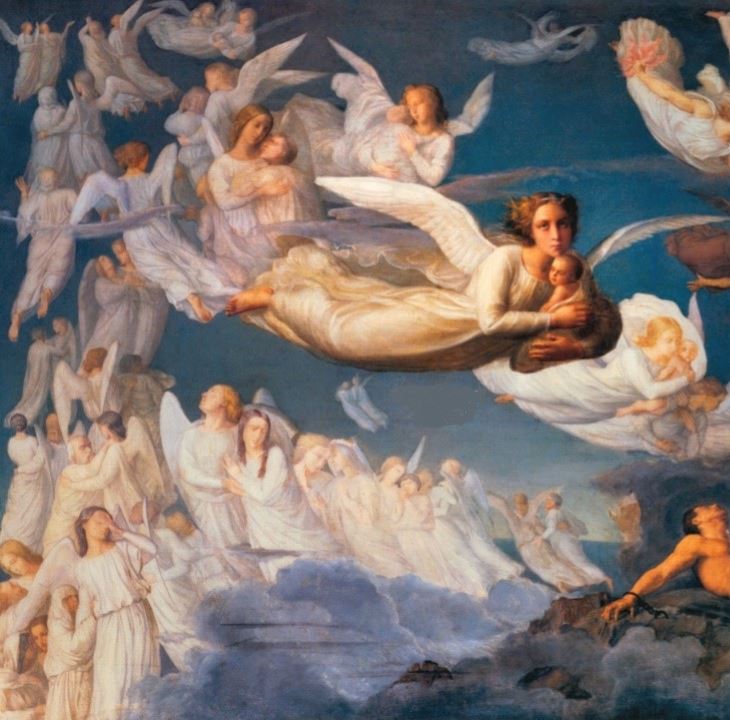 When you thus awaken, when you are thus reconsciousized, you will then see for the first time your long-loved and ever-present angelic companions from your days on Urantia. You will also become keenly aware of the identity and presence of your divine Father fragment who so long indwelt the mind of your mortal existence. This is a true rebirth in all respects, a true spiritual transformation of such magnitude that it is only by the close and loving presence of your destiny guardians and your Thought Adjuster that you will be able to effectively connect your new morontia consciousness with the reviving memory of your previous identity.
When you thus awaken, when you are thus reconsciousized, you will then see for the first time your long-loved and ever-present angelic companions from your days on Urantia. You will also become keenly aware of the identity and presence of your divine Father fragment who so long indwelt the mind of your mortal existence. This is a true rebirth in all respects, a true spiritual transformation of such magnitude that it is only by the close and loving presence of your destiny guardians and your Thought Adjuster that you will be able to effectively connect your new morontia consciousness with the reviving memory of your previous identity.
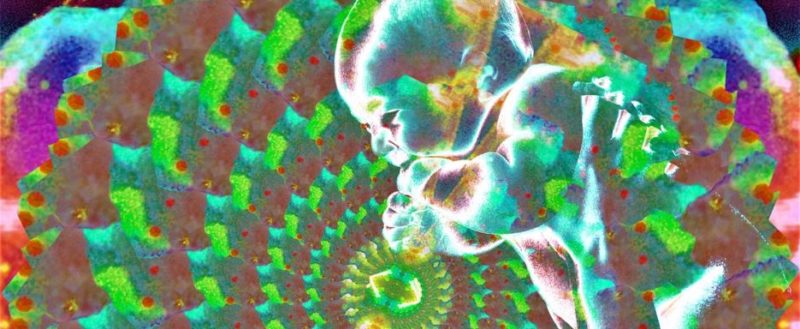 As the creative source of local universe intellect, the Mother Spirit ministers a translated modification of cosmic mind to directly assist in the evolution of morontia (soul) mind. Whereas adjutant mind can freely operate within a pattern of material-energy, the superadjutant morontia soul requires the presence of the Adjuster to fully attain self-consciousness. The human mind and the indwelling Adjuster are each aware of the differential presence of the evolving soul, and the soul becomes conscious of the mortal mind and the indwelling Adjuster.
As the creative source of local universe intellect, the Mother Spirit ministers a translated modification of cosmic mind to directly assist in the evolution of morontia (soul) mind. Whereas adjutant mind can freely operate within a pattern of material-energy, the superadjutant morontia soul requires the presence of the Adjuster to fully attain self-consciousness. The human mind and the indwelling Adjuster are each aware of the differential presence of the evolving soul, and the soul becomes conscious of the mortal mind and the indwelling Adjuster.
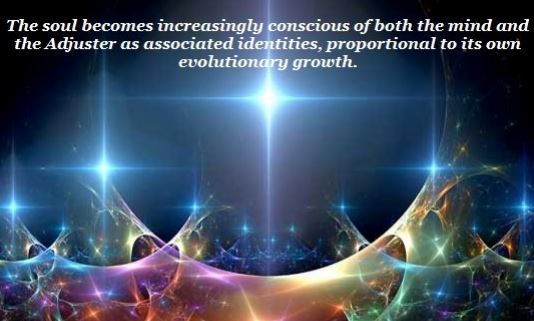 The soul is the joint creation of mortal mind and indwelling Adjuster. The soul is the child of the God-seeking mortal mind and the indwelling presence of the God-revealing and immortal Thought Adjuster. Its spiritual growth is independent of the intellectual self-consciousness, but it is capable of experiencing the presence of the Thought Adjuster and of recognizing its spirit leadings. Spirit identification is propelled by the strivings of mortal mind and survival is conditioned by the desires of mortal mind. The evolving soul will be an eventual portrait of the sum total of mortal decisions.
The soul is the joint creation of mortal mind and indwelling Adjuster. The soul is the child of the God-seeking mortal mind and the indwelling presence of the God-revealing and immortal Thought Adjuster. Its spiritual growth is independent of the intellectual self-consciousness, but it is capable of experiencing the presence of the Thought Adjuster and of recognizing its spirit leadings. Spirit identification is propelled by the strivings of mortal mind and survival is conditioned by the desires of mortal mind. The evolving soul will be an eventual portrait of the sum total of mortal decisions.
 Mortal mind initiates the universe career of pre-morontia ascension by working in close coordination with the seven adjutant mind-spirits as these are progressively subjected to the unifying direction of the top spirit, the spirit of wisdom. This highest functioning of adjutant mind-spirits assists the mortal creature in the completion of the seven psychic circles of premorontia attainment [110:6]. This mortal mind becomes increasingly motivated in its ongoing search for the supreme realities of truth, beauty, and goodness, and these discoveries ever harmonize themselves with the mortal's supernal goal of completing the seven circles. All this associated effort inevitably leads to the embryonic growth of the mortal soul and its eventual endowment with morontia mind. This act anticipates the morontia career of local universe progression.
Mortal mind initiates the universe career of pre-morontia ascension by working in close coordination with the seven adjutant mind-spirits as these are progressively subjected to the unifying direction of the top spirit, the spirit of wisdom. This highest functioning of adjutant mind-spirits assists the mortal creature in the completion of the seven psychic circles of premorontia attainment [110:6]. This mortal mind becomes increasingly motivated in its ongoing search for the supreme realities of truth, beauty, and goodness, and these discoveries ever harmonize themselves with the mortal's supernal goal of completing the seven circles. All this associated effort inevitably leads to the embryonic growth of the mortal soul and its eventual endowment with morontia mind. This act anticipates the morontia career of local universe progression.
Self-realization and mind-attainment are the supernal and divine goals that the Universal Father sets before his mortal children. The mortal progression through seven psychic circles of cosmic advancement brings about a growing sense of cosmic consciousness and a greater kinship of the evolutionary soul with the emerging Supreme Being. As the mortal being progresses to the soul level of morontia consciousness, he becomes better able to grasp universe meanings and to realize divine values. These accomplishments provide a greater awareness of true universe citizenship and the ensuing promise of local universe progression.
Mastery of the first psychic circle, the final and most accomplished cosmic level of creature mastery, signals the well-earned attainment of premorontia mind maturity. This achievement effectively terminates the collective ministry of the adjutant mind-spirits as the sole and exclusive influence of mind-activity in the mortal personality. Mortal mind now becomes increasingly sensitive to the superimposition of the endowment of morontia mind upon adjutant mind, and this initiates the prespiritual, or morontia, stage of personal evolution. This new mind begins to enjoy the ministry of a superadjutant endowment of the Creative Spirit, an endowment of mind more harmoniously in alignment with cosmic mind.
Progress in the seven psychic circles of mortal advancement entails experiential expansion in personality status, mind attunement, soul growth, and Adjuster attunement. The harmonious functioning of the entire personality, the expansion of the entire self—material, intellectual, and spiritual—characterizes this growth. As the mortal creature superimposes this endowment of morontia soul intellect upon adjutant mind, the creature eventually becomes solely dependent on morontia mind. He begins to seek attunement with the direct ministry of superuniverse cosmic mind; he begins to strive for higher levels of a spiritual existence that lie just beyond the morontia level.
Creature mind experience:
- Native planet—adjutant ministry.
- Local universe—morontia intellect.
- Superuniverse—the direct ministry of cosmic mind.
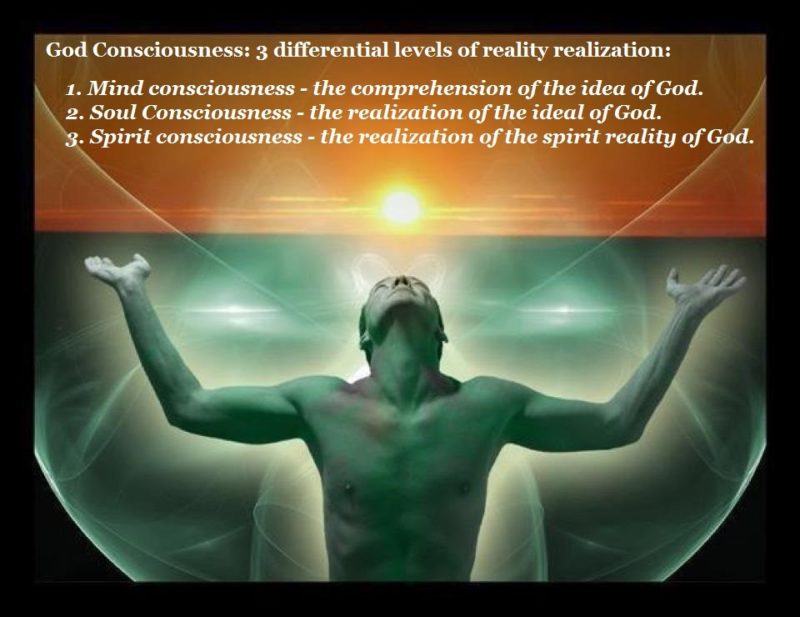 The evolution of morontia mind is enacted through contact with a modification of cosmic mind that is directly translated by a Divine Minister throughout the vast expanses of her local universe domain. As the creative source of local universe intellect, the Mother Spirit ministers a translated modification of cosmic mind to directly assist in the evolution of morontia mind. We are told that revelation is a technique of atonement for the absence of morontia mind in mortal man for bridging the morontia gulf between the physical and the spiritual realms.
The evolution of morontia mind is enacted through contact with a modification of cosmic mind that is directly translated by a Divine Minister throughout the vast expanses of her local universe domain. As the creative source of local universe intellect, the Mother Spirit ministers a translated modification of cosmic mind to directly assist in the evolution of morontia mind. We are told that revelation is a technique of atonement for the absence of morontia mind in mortal man for bridging the morontia gulf between the physical and the spiritual realms.
The mortal mind, encircuited into the adjutant ministry of the local universe Mother Spirit, is fully subject to the acts and choosing of the will of human personality. Although the mortal creature possesses identity only on the material level of existence, mortal personality can act by virtue of its freewill choosing to literally transfer …its seat of identity from the passing material-intellect system to the higher morontia-soul system which, in association with the Thought Adjuster, is created as a new vehicle for personality manifestation [112:5:4]. This superadjutant morontia soul requires the spirit presence of the Adjuster to retain self-consciousness.

|
|
Mark Kurtz, USA  I feel like sharing a concept heard from a Sunday school teacher about 30 years ago. Not recalling the topic, I do remember the concept—people develop a personal model of life and relationships, including religion, financial management, child rearing, jobs, free time, food, sex, well… everything. Many live according to what parents and grandparents modeled and according to what is perceived as community normal. This model contains the acceptances, decisions, priorities, and motives that drive everyday life. The teacher asked us to think about what we would do if something comes along that doesn’t fit our model. He said there are only two choices: 1) accept it, which is a revision, or 2) reject it and leave the model unchanged.
I feel like sharing a concept heard from a Sunday school teacher about 30 years ago. Not recalling the topic, I do remember the concept—people develop a personal model of life and relationships, including religion, financial management, child rearing, jobs, free time, food, sex, well… everything. Many live according to what parents and grandparents modeled and according to what is perceived as community normal. This model contains the acceptances, decisions, priorities, and motives that drive everyday life. The teacher asked us to think about what we would do if something comes along that doesn’t fit our model. He said there are only two choices: 1) accept it, which is a revision, or 2) reject it and leave the model unchanged.
True, we can delay a decision, which doesn’t change the model, but the choice may bother a person until a decision is rendered. And perhaps many years are needed to move on a decision.
Urantia Book authors affirm we cannot sit on the fence. We must accept or reject God. Further, we cannot sit still; the whole cosmos is action oriented, not static. Jesus desires personal progress, which if you consider its implications, could be multiplied throughout humanity and could, therefore, improve the entire planet. He has a plan in mind! The entire universe is one big university dedicated to progress.
Jesus presented a substantial multi-challenge to the Jewish authorities because his teachings did not fit their model. They had been taught for centuries that they were special, and a Messiah would rescue them from foreign domination. They wanted a materialistic ruler to fit their perceived model of world rule, but they could not fit Jesus’ teachings into this model.
So, for us today, is The Urantia Book a grand attempt to help humanity revise its models? I believe it is. We need progress! Those who listen carefully to the authors and discern their meanings are those likely to progress. We will comprehend what Jesus wants for us, either here or after graduating to the next life! God’s will shall prevail.
We could revise our personal models and join his growing team as best as we can, and in the most loving and patient manner with our fellows! Some of those who may be close to us will not be progressive, perhaps not to our liking, but that factor is not justification to halt our personal progress. Personal religious growth is available to anyone regardless of all other relationships. I wish you well in your eternal journey!
|
|
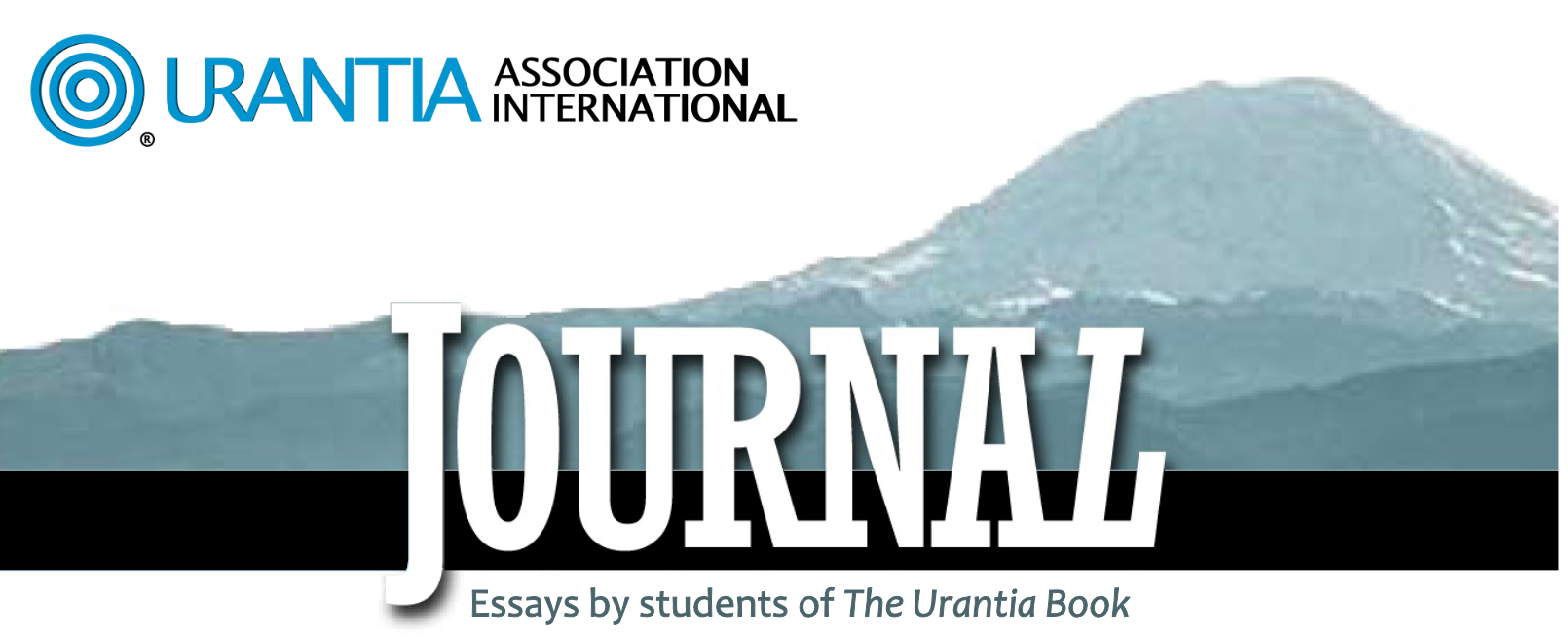
The Journal is produced twice yearly and contains essays, articles and study aids by readers and for readers of The Urantia Book. Any interpretations, opinions, conclusions, or artistic representations, whether stated or implied, are those of the authors and do not necessarily represent the views and opinions of Urantia Association International, the National or Affiliate Urantia Associations, or the editorial team of the Association's Journal.
You can view the entire collection of issues in the archives. All issues before 2017 are downloadable PDF format.
The Journal is currently published in English  , French , French  and Spanish and Spanish  . (There are some older issues that were published in Finnish . (There are some older issues that were published in Finnish  .) You can view the French and Spanish Journals by clicking on the language choices in the pull down menu at the top of the page. .) You can view the French and Spanish Journals by clicking on the language choices in the pull down menu at the top of the page.
Subscriptions
The Journal is available electronically free of charge for anyone with an email address. Join our mailing list to receive free electronic copies.
To receive hard copies, you may subscribe to the Journal at the annual rate of $15.00 USD via any of the following methods:
- To subscribe on line click here
- To subscribe by telephone call: +1-773-572-1180
- To subscribe by check or money order, please send in $U.S. dollars only and make payable to “Urantia Association International”. Mail to:
Urantia Association International
4000 W Montrose Avenue #606
Chicago, IL 60641
Journal Team
- Chief Editor: Richard Jernigan
- Editors: James Woodward, Mark Blackham
- French Newsletter: Alain Cyr and associated translators
- Spanish Newsletter: Olga Lopez
- Communications Chair: Myra Hight
Journal team is currently seeking reports and submissions from all Urantia Book students.
Submission Policy
The Journal editorial team welcomes all article submissions for consideration for current or future issues. Any submissions not used in the current issue are kept on file for potential future use. Urantia Association International does not compensate any author through payment or in any other manner for such voluntary submissions. The Journal editorial team reserves the right to reject or edit materials as it deems necessary for publication and, if edited substantially, will notify the author for their approval.
Send correspondence or article submissions to the above Chicago address or email the Chief Editor, Richard Jernigan.
Images
All contributors — if you submit images, you must either have the rights to those images or they must be in the public domain. In all cases, please include the appropriate credits.
Journal includes images from Pixabay and Unsplash. Many thanks to these companies and their artists for the wonderful service they provide. Image credits are assigned when available.
Citation Guidelines
Please follow our citation guidelines when quoting from The Urantia Book. These guidelines were revised in April 2023, including different citation styles.
Block Quotes
Block quotes are displayed as a separate paragraph, which can be a complete paragraph from the book or any portion thereof. They do not require quotation marks. Block quotes use the citation format shown below, where the first set of numbers refers to paper, section, and paragraph, and the second set refers to the page and paragraph of the editions of The Urantia Book as published by Urantia Foundation. Please note the punctuation.
The Universal Father is the God of all creation, the First Source and Center of all things and beings. First think of God as a creator, then as a controller, and lastly as an infinite upholder. 1:0.1 (21.1)
If you wish to emphasize words that are not already emphasized in The Urantia Book, add “emphasis added” at the end of the page reference.
First think of God as a creator, then as a controller, and lastly as an infinite upholder. 1:0.1 (21.1) emphasis added
Run-in or In-line Quotes
Run-in quotes form an integral part of your own paragraph. Put these quotes within quotation marks (no italics). They require only a short form citation including paper, section, and paragraph. Notice that the citation is included as a part of the quote with the period (full stop) following the quote. For example:
The Urantia Book starts out with a positive assumption, "The Universal Father is the God of all creation” (1:0.1).
Any run-in quote exceeding four lines should be separated out as a block quote. And similar to block quotes, any emphasis added to a run-in quote requires adding "emphasis added" to the citation.
Paraphrasing
If you paraphrase a quote, or derive information from any paragraph, use the same run-in quotation style.
The Universal Father is portrayed in The Urantia Book as a creator, controller and upholder (1:0.1).
References to other works
If you use quotes from, or make references to, other works, please include a citation in order to avoid plagiarism.
In these cases, mention Author, Title, and Year, either in the text or immediately following a quote. Alternatively, include the citation as a numbered footnote.
Size of Submissions
Please limit the size of your submission to 4,000 words or less. We encourage you to use your own words as much as possible and to avoid overusing quotes from the book. Direct quotations are more effective if they are used sparingly and for emphasis.
We always welcome articles about personal spiritual experiences as well as those with fresh insights and new perspectives. Also of interest are thematic studies and articles that compare, evaluate, or integrate academic research (scientific, social, religious, or otherwise) with the teachings of The Urantia Book.
|
|
